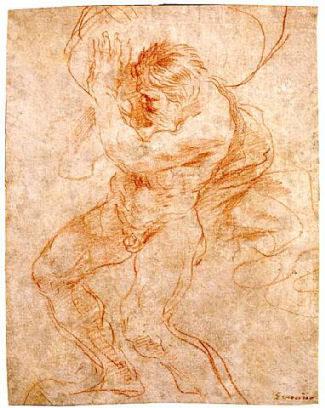
LIFE AS MYTH
![]()
JOURNAL
![]()
JOURNAL 2007
![]()
Following a white hart
Exploring myth & meaning
![]()
SPRING 2007
The gift of fire
![]()
LIFEWORKS
![]()
ATLAS
![]()

SPRING 2007
SISYPHUS AND THE ROCK
Sisyphus. Giovanni Francesco Barbieri, also known as Guercino. 1638. Private collection.
In Greek mythology, Sisyphus is a masterful trickster who received eternal punishment for defying the gods. At the end of his life, Sisyphus outwitted Death by tricking him into donning his own shackles. Death remained chained until Ares, the god of war, freed him. Death then returned to escort Sisyphus to the Underworld. Before leaving the earth, however, Sisyphus instructed his wife to leave his body unburied. When he arrived in the Underworld, Sisyphus asked Persephone, Queen of the Dead, for permission to return to earth to make arrangements for his burial. Persephone granted his request. Upon his return, Sisyphus neglected his burial, defied the gods, and engaged in the delights of his impulses and desires. Not long after, Death came a third and final time.
When Sisyphus finally arrived in the Underworld, the gods sentenced him for his willfulness. His punishment was to roll a large boulder over the top of a high mountain and down the other side. This task might have been accomplished on the first attempt by a mortal as powerful as Sisyphus. However, each time he pushed the boulder to the summit, the stone would slip from his grasp and roll back down to the base. In this way, the gods were appeased.

